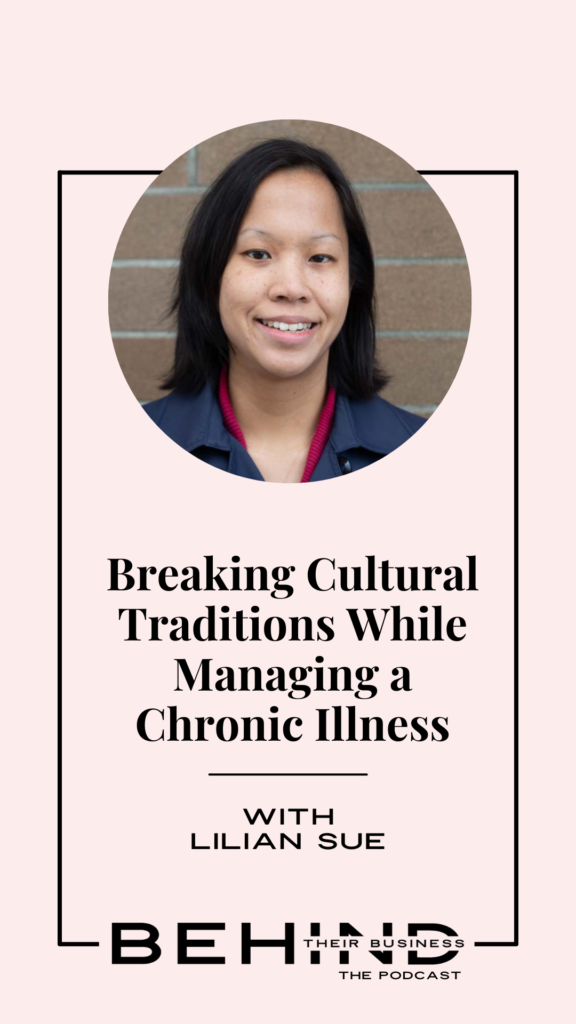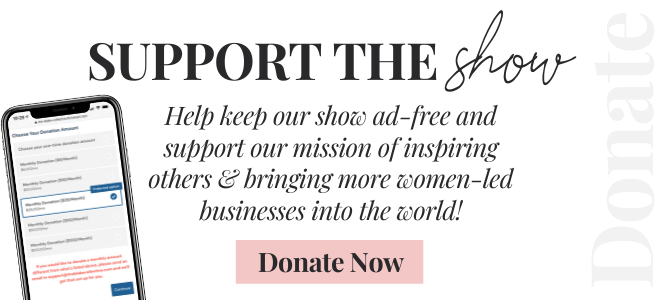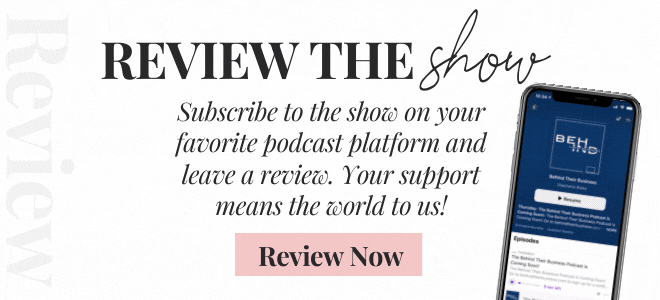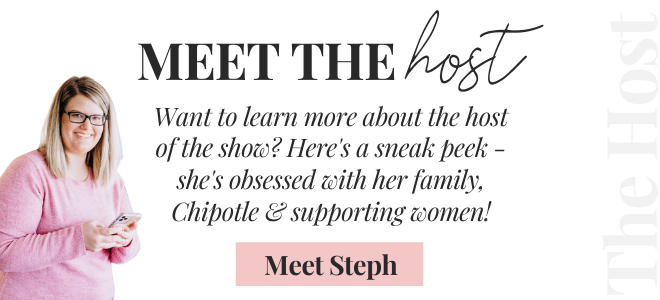WORKSHOP
Free
In this LIVE training, you'll learn the exact system to work less than 20 hours per week and make 6+ figures in one year with 1 team member & no ads.
Breaking Cultural Traditions While Managing a Chronic Illness with Lilian Sue
February 21, 2022
Please share some of your background with us and what led you to start your business [1:04]
Lilian: I am a first-generation Chinese-born Canadian. I started my entrepreneurship journey sort of by accident!
I was in the middle of my university degree and I was doing a work experience program. I often thought, “no one is going to hire me if they don’t know what I can do.”
So, from there, I began to figure out how to build my portfolio. I started out on the copywriting and social media side in the mid-2000s to gain that experience and sort of grew from that.
I got started in publicity because I had a lot of clients coming to me and asking me, “hey, do you offer PR as a service?” It gradually transitioned into the PR coaching side because many people were interested in the PR aspect, often saying that they would love to hire me to complete a campaign for them, but they simply couldn’t afford it.
That made me take a step back and look at the overall business side of it. There had to be a better way to reach the audience of these amazing entrepreneurs. So, my next question to myself was, “how could I bridge that gap?”
I’ve been in this line of work for a long time and been in business for myself for almost 15 years, so my thinking was, “how do I educate?” Coaching came about as a middle ground between the two.
I could do the campaign myself for them instead of them taking my course. Coaching is the more personalized and hands-on of the two. I’m on there with them on the calls, helping them brainstorm, giving them resources that will help them answer a lot of their own questions.
“One of the greatest feelings in the world is when the lightbulb comes on for my clients.”
I also love to help them be able to bust mindset blocks that hold them from moving forward. It’s really just showing them their full potential of what they can do.
In relation to your culture and the traditions you grew up with, could you share some of the culture, traditions that you’ve broken, and the challenges you have faced and overcome regarding your business? [8:24]
Lilian: As I mentioned before, I’m a first-generation Chinese-born Canadian. My parents are immigrants from Guangzhou in southern China.
And although they’ve been in Canada for several years, there is a very set way of looking at careers and how you make money. The framework that I grew up in was the path of going to college, obtaining the degree, and then searching and obtaining that one job, which you work for 20 to 30 years, until retirement.
Then you collect that pension and retire.That’s their framework, their mentality. In their mind, what mattered the most was financial stability. They didn’t think about burnout, being challenged, the vacation time, the value of my time, sick days offered, or the happiness behind working that one job.
There was no discussion of any of that and that’s how they live their lives. That’s how they lived their lives, from before I was born, right up to when they retired. We didn’t have any sort of entrepreneurship role model to look up to.
My older brother also found himself pushed into entrepreneurship as a chiropractor in Seattle. After working for other chiropractors he decided to buy his own practice.
Through him, I caught a glimpse of what he really takes to learn how to run a business, to manage things behind the scenes, such as invoices, managing overhead, looking for creditable help, and who also understood where you’re coming from.
Even with all of that guidance, I still went through a lot of pitfalls because like I said, my parents didn’t and don’t understand the entrepreneurship world. To them, we are giving up what seems like guaranteed financial stability.
As luck would have it, when I started building my business, it was right around the time the recession hit, when I was going through work experience, college, and so on. Everyone was tightening their bottom lines, to save money.
Instead of hiring someone full-time for marketing, businesses were deciding to market themselves to save money. So from an external standpoint, I was faced with companies and other agencies who were tightening their belts and closing their doors, leaving me wondering how I could find those opportunities that I needed to really grow.
In the early days, I soon found that I needed tenacity in order to find projects. I was on the phones and emailing 40 to 50 companies a day, just seeing who was out there and who I could network with and build those relationships I needed.
I also had to understand that this type of work wouldn’t happen overnight. It was about the long haul as I grew and looked for more clients. The change really happened when I made the switch from a service provider to more of a coach.
And even so, at the time, I was getting burned out. I wasn’t enjoying most of the aspect any longer. I didn’t like waiting for people to realize they needed a PR person, that they needed help with social media.
People would look at the price tag more than what I could do for them. I look at my clients as my team.
That’s what we are. We work together toward the common goal of what they need. I soon came to the realization that I was burned out, that I wasn’t helping anyone in the way I wanted to because of the burnt-out.
There was no talk about mindset or mental health in my household, particularly when it came to careers. Whatever happened, we were taught to just grin and bear it, whether we liked it or not. It’s there.
Move past it and be done. But the thing is, the more I did that, the more I realized how damaging it was because not only did I feel like I was stuck mentally and emotionally, but I also didn’t feel like I had the tools, the skills, the resources, or even the support to move forward.
At the time I sought out mental health and career counseling to try and grasp where I was going. I eventually worked through my issues with my mindset coach and she has helped me break through the mental barriers I don’t think I ever knew I had.
One of the things my mindset coach had me change was my perspective. Instead of just thinking people don’t need to know more about myself, that I needed to really get out there and talk to people, letting them know more about what I actually do and what I can do for them vs the mindset of what I was thinking.
My mindset was all wrong and I had to fix that. When I came to that realization, my whole outlook on my business and my career completely changed. Control was a running theme in my life. I was supposed to work for 20 – 30 years, get that pension, and essentially be a homeowner.
Even have kids and all of these traditions which includes doing certain jobs for my parents. They’ve always pushed us to work for the government because my dad did it and he worked for 30 years and then retired with his pension.
So my thought was how to get that control back from the cultural traditions I had grown up with and yet at the same time, relinquish it? I know that sounds weird because a lot of that also played into my chronic illness.
I would get flare-ups with stress, with worrying. I was constantly worried about what people thought, how they would respond, where the money was coming from, and even whether or not I was connecting with the right people, the right network.
I had to mentally take a step back and work on my own mindset.I finally started putting stuff out there and quite obsessively checking to see who responded, and when. People finally started to engage.
They started asking me questions, booking appointments, and I eventually got to the point where I just let them know that I was available to help them if needed but didn’t push. So in relinquishing my control, my obsessiveness, I finally had that freedom to control what I could.
Now my motto on a daily basis is, “If I’ve done everything to the best of my abilities for today, that’s a win. I’m good. I’ve had a great day.”
“If I’ve done everything to the best of my abilities for today, that’s a win. I’m good. I’ve had a great day.”
Once you made this switch, how did your parents react to that? [23:22]
Lilian: Well, they weren’t happy. There was a lot of head-butting, particularly in the early days, and my mindset became, “you don’t have to like it.
I’m not living under your roof any longer, or asking you for any money.” So that is a boundary I don’t cross with them. They ask how work is going and I tell them it’s fine.
Outside of that, we just don’t talk because there are so many elements of that that they don’t and can’t relate to. They just really don’t understand the mindset piece.
They don’t understand the mental health aspect and they also don’t necessarily equate what had been happening with my chronic illness.
So, concerning your chronic illness – How did that flare up and start, if you don’t mind sharing? [24:36]
Lillian: I first got diagnosed about eight years ago. It started to really flare up with the first sign of bad heartburn. At the time, I wasn’t doing anything different in terms of what I was eating or how I was sleeping.
I was wedding planning at the time and finances were tight for us, so I started getting these flare-ups and it felt like someone was squeezing my rib cage. The first time we had to go to the hospital and get a multitude of tests such as scans and everything, the result came back as dyspepsia.
The flareups resulted, not from diet and such, but stress and anxiety. Those two are the real key aspects to the flareups.
With running my own business, my sleep was affected, my energy was low during the day when I was awake, and when things got stressful, when I started to internalize, the flareups would result.
The more things I tried to internalize, the worst it got, the more flareups I would have. For the most part, I would be fine during the day. It was when I went to sleep for a few hours and then suddenly, I was up at 11:30 pm and then around 1 am, the flareup would be bad, to the point where I was losing hours of sleep.
That’s the worst thing you could do because the next day, I was a zombie. It was hard to function.
I’ve controlled it through the years, through dietary supplements from my naturopathic doctor.The most important thing that I accomplished was again, changing my mindset the way I was taught. I used to get flareups, maybe once every other month.
Now it’s a couple times a year, which is a big improvement. It hasn’t gone away completely, but it’s much easier to control.
“The most important thing that I accomplished was changing my mindset from the way I was taught.”
Now when I have stressful situations, I will turn on a meditation track or a hypnosis track that my mindset coach created for me. It helps me to deal with these types of situations in a healthier way, which includes asking myself very important questions.
Did you want to like work with this person to begin with? Or in the case of a client, have you done everything to the best of your ability that you knew how to do at that time? If the answer to that first question was no, and the answer to the second question is yes, then why was I stressing?
I’ve learned a lot more in the past couple of years and have learned how to recognize where either people are at too in the grand scheme of things. I think once you start to work through things internally, through that mindset we talked about, it naturally happens when you start to see things happening in other people as well.
CONNECT WITH LILIAN SUE
RESOURCES MENTIONED



